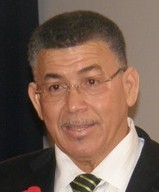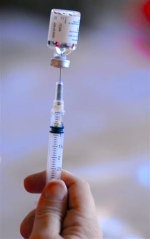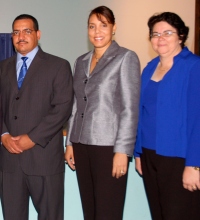Archive for November 18th, 2009

Mac: Investors show interest
 (CNS): With the first leg of his Cayman road show behind him, the new premier has said that the incentive package he is promoting to the financial services industry has received some promising feedback. Although McKeeva Bush said the trip to London and several US cities had not been easy, it was not all doom and gloom. Speaking in the Legislative Assembly in the first session following the signing of the new Constitution, Bush criticised those who, he said, were twisting the immigration policy changes which were designed to encourage business and investment back to Cayman.
(CNS): With the first leg of his Cayman road show behind him, the new premier has said that the incentive package he is promoting to the financial services industry has received some promising feedback. Although McKeeva Bush said the trip to London and several US cities had not been easy, it was not all doom and gloom. Speaking in the Legislative Assembly in the first session following the signing of the new Constitution, Bush criticised those who, he said, were twisting the immigration policy changes which were designed to encourage business and investment back to Cayman.
“I am amazed that these adjustments are being twisted around by people with political motives,” he said. The only tool Cayman had to fight the recession was to encourage business and investment to Cayman, Bush added, and said that was what the new policies were all about. Cayman could not operate an open economy with protectionist policies, he observed.
The premier confirmed that there would be changes to both immigration policy and the law as an incentive for financial institutions to move their actual operations to the Cayman Islands. Bush explained that these incentives were what the road show was promoting in what was a very competitive environment. Cayman was not the only jurisdiction trying to attract this inward investment, he said, noting that some investors had already expressed their interest in reaction to what Cayman was prepared to facilitate to attract the business.
The incentive package that Cayman is offering includes access to 3-5 year work permits for financial service entities relocating their operations here, which could be renewed; rapid turn around on immigration decisions; key employee status for senior staff; the introduction of a 25 year residency certificates for those bringing over $2 million of investments; and fast track CIMA applications, among other measures.
Bush told the House that, as Cayman had no reserves left on which the government could draw and was constrained by the limits of PMFL and the UK when it came to borrowing, it was extremely limited in how it could stimulate the economy. “My administration has recognised the only way to address the economic difficulties is by making policy changes to encourage business,” the premier said.
He warned that the world did not need Cayman but that Cayman needed the world and the jurisdiction had to make itself more competitive. Bush said the country’s competitor jurisdictions were not just watching but were also wooing investors with a range of incentives that were difficult to match.
“We must do what is necessary to get out of this mess,” Bush told his legislative colleagues before the LA adjourned for lunch. Government will be delivering the strategic policy statement this afternoon (18 November).

Marathon run in aid of Breast Cancer Foundation
 (CNS): Local accountant Richard Horton of Baker Tilly (Cayman) Ltd. took part in the ING New York City Marathon on the 1 November, and in doing so helped raise funds for The Breast Cancer Foundation of the Cayman Islands. This was Horton’s 4th New York City Marathon. Asked why he decided to run the New York City Marathon again, he replied, “The New York City Marathon is a great experience which takes runners through each of the city’s boroughs namely Staten Island, Brooklyn, Queens and Bronx before finishing in Manhattan’s Central Park. I enjoy it every year for the support and atmosphere generated by all the spectators.”
(CNS): Local accountant Richard Horton of Baker Tilly (Cayman) Ltd. took part in the ING New York City Marathon on the 1 November, and in doing so helped raise funds for The Breast Cancer Foundation of the Cayman Islands. This was Horton’s 4th New York City Marathon. Asked why he decided to run the New York City Marathon again, he replied, “The New York City Marathon is a great experience which takes runners through each of the city’s boroughs namely Staten Island, Brooklyn, Queens and Bronx before finishing in Manhattan’s Central Park. I enjoy it every year for the support and atmosphere generated by all the spectators.”
Horton has raised funds for a number of local charities, having lived on Grand Cayman for nearly five years. This year he decided to raise money for the Breast Cancer Foundation. “I wanted to raise funds for a local charity” he says, “and since October was National Breast Cancer Awareness Month in the United States it seemed the ideal way to support the community here in Cayman.”
Horton’s employer in Grand Cayman, Baker Tilly (Cayman) Ltd., donated US$1,000 toward the cause. Connie Swart, of Baker Tilly (Cayman) Ltd. Explained, “We are proud to sponsor such a worthwhile cause because here at Baker Tilly (Cayman) Ltd. we believe investing in our employees, our clients, and the communities we serve, benefits all of us.”
James Bovell, Director of The Breast Cancer Foundation said: “We would like to thank Richard for his support and Baker Tilly (Cayman) Ltd. for their generous contribution to the Foundation.” Bovell added: “Although our main fundraising event The Breast Cancer Gala Dinner is in October, we continue working for the cause throughout the year and would like to encourage everyone to support us.”
Anyone wishing to make a donation to the Breast Cancer Foundation can do so by emailing Janet Jarchow on info@breastcancergala.ky or call 949 4822.
Photo: Connie Swart of Baker Tilly (Cayman) Ltd. presents Horton with the donation.

Two arrested for trojan virus that steals bank details
 (BBC): Two suspected computer hackers have been arrested in Manchester in a major inquiry into a global internet scam designed to steal personal details. The trojan program is believed to have infected thousands of computers around the world, said the Metropolitan Police, which is leading the inquiry. A man and woman, both aged 20, have been questioned and bailed until March 2010 pending further inquiries. Police revealed the arrests were the first in Europe as part of the inquiry. The investigation focused on the ZeuS or Zbot trojan – "a sophisticated malicious computer program", said police.
(BBC): Two suspected computer hackers have been arrested in Manchester in a major inquiry into a global internet scam designed to steal personal details. The trojan program is believed to have infected thousands of computers around the world, said the Metropolitan Police, which is leading the inquiry. A man and woman, both aged 20, have been questioned and bailed until March 2010 pending further inquiries. Police revealed the arrests were the first in Europe as part of the inquiry. The investigation focused on the ZeuS or Zbot trojan – "a sophisticated malicious computer program", said police.

Somali woman stoned to death for adultery
 (BBC): A 20-year-old woman divorcee accused of committing adultery in Somalia has been stoned to death by Islamists in front of a crowd of about 200 people. A judge working for the militant group al-Shabab said she had had an affair with an unmarried 29-year-old man. He said she gave birth to a still-born baby and was found guilty of adultery. Her boyfriend was given 100 lashes. According to reports from a small village near the town of Wajid, 250 miles (400km) north-west of the capital, Mogadishu, the woman was taken to the public grounds where she was buried up to her waist. She was then stoned to death in front of the crowds on Tuesday afternoon.
(BBC): A 20-year-old woman divorcee accused of committing adultery in Somalia has been stoned to death by Islamists in front of a crowd of about 200 people. A judge working for the militant group al-Shabab said she had had an affair with an unmarried 29-year-old man. He said she gave birth to a still-born baby and was found guilty of adultery. Her boyfriend was given 100 lashes. According to reports from a small village near the town of Wajid, 250 miles (400km) north-west of the capital, Mogadishu, the woman was taken to the public grounds where she was buried up to her waist. She was then stoned to death in front of the crowds on Tuesday afternoon.

Patients in UK ‘shunning’ swine flu jab
 (msn): More than half of patients are turning down the swine flu vaccine, a snapshot survey has suggested. A Pulse magazine poll of 107 GPs found some people were concerned about possible side-effects of the jab while others believed there was no need to have it because the virus is mild. Family doctors are currently vaccinating people at high risk from swine flu, including pregnant women, health workers and those with asthma, heart disease and diabetes. The poll of GPs in England found resistance to the jab was particularly high among pregnant women and, overall, only 46% of patients offered the vaccine are thought to have said yes.
(msn): More than half of patients are turning down the swine flu vaccine, a snapshot survey has suggested. A Pulse magazine poll of 107 GPs found some people were concerned about possible side-effects of the jab while others believed there was no need to have it because the virus is mild. Family doctors are currently vaccinating people at high risk from swine flu, including pregnant women, health workers and those with asthma, heart disease and diabetes. The poll of GPs in England found resistance to the jab was particularly high among pregnant women and, overall, only 46% of patients offered the vaccine are thought to have said yes.

Bill offers hope for abused
 (CNS): A bill designed to update the existing law and which contains wider protection to women, children, families and other victims from the scourge of domestic abuse will, if it’s passed, offer hope to many who suffer behind closed doors. The consultation period for the new legislation has been extended until the end of November, and officials hope those who have experienced this kind of violence and abuse will add their comments and contributions to ensure the new law will have teeth and protect the vulnerable.
(CNS): A bill designed to update the existing law and which contains wider protection to women, children, families and other victims from the scourge of domestic abuse will, if it’s passed, offer hope to many who suffer behind closed doors. The consultation period for the new legislation has been extended until the end of November, and officials hope those who have experienced this kind of violence and abuse will add their comments and contributions to ensure the new law will have teeth and protect the vulnerable.
The minister with responsibility for gender affairs, Juliana O’Connor-Connolly, welcomed the Protection Against Domestic Violence Bill, 2009 which will repeal the 17-year-old Summary Jurisdiction (Domestic Violence) Law.
“I am encouraging members of the public to give their suggestions and recommendations on this key law, which is only going to strengthen our families and thereby the fabric of our community,” O’Connor-Connolly said. “This is a very important piece of legislation, as it gives social services officers, law enforcement and prosecutors better tools with which to advocate for those affected by domestic violence.”
The bill is currently posted on the GIS website and has been circulated for public discussion by the Law Reform Commission. The discussion period ends on Monday, 30 November, following an extension from the original 20 November deadline.
It defines more specifically what actions constitute domestic violence; details who is protected; defines who is considered a child under the law; types of court orders available; and who may initiate proceedings.
“The expanded definition of what constitutes domestic violence is a major step forward, as it gives broader coverage to victims. We know from experience that domestic violence goes beyond physical abuse,” the minister added. According to the bill, “a person commits an act of domestic violence against a prescribed person where it is proved that his conduct caused or is intended to cause emotional or psychological; financial, physical or sexual abuse.”
Gender affairs policy advisor in the ministry, Tammy Ebanks Bishop explained that the review of this legislation came about as a result of the recommendations contained in the special report on gender violence, which was submitted to Cabinet in December 2008 by a special advisory committee on gender violence. Ebanks Bishop said the various expansions of definitions and provisions being proposed in the new bill aim to provide protection to the most vulnerable people who are, or who may become, victims of domestic violence.
The bill addresses a number of problems presented by the old law such as the constraint of domestic violence to the marital home. Abuse and violence can often occur between couples who no longer reside in the same house but because of child-ties may still spend considerable time together. The new law also takes in consideration the changing definition of family and the more complex modern relationships that exist in today’s reality.
For more information, or to provide feedback on the Protection against Domestic Violence Bill, please visit www.gov.ky.

New options for 16+ students
 (CNS): Students will be taking CXC and GCSE external exams in Year 11 following the Education Ministry’s major restructuring of secondary education next academic year, bringing it inline with the British education system on which the Cayman system is based. However, students’ compulsory schooling will continue for an additional year, in which they can take advanced academic or vocational courses or work training. Currently, students take external exams at the end of Year 12 after 6 years of secondary education, while their UK counterparts take GCSE or equivalent exams after 5 years. (Left: Minister Rolston Anglin, CO Mary Rodrigues and CEO Shirley Wahler)
(CNS): Students will be taking CXC and GCSE external exams in Year 11 following the Education Ministry’s major restructuring of secondary education next academic year, bringing it inline with the British education system on which the Cayman system is based. However, students’ compulsory schooling will continue for an additional year, in which they can take advanced academic or vocational courses or work training. Currently, students take external exams at the end of Year 12 after 6 years of secondary education, while their UK counterparts take GCSE or equivalent exams after 5 years. (Left: Minister Rolston Anglin, CO Mary Rodrigues and CEO Shirley Wahler)
However, it appears that these changes will not be applied to the Cayman Brac High School at this time, though no explanation for this has been given. Brac students will continue to take the bulk of their exams at the end of Year 12 and not benefit from the new offerings of the additional year.
Announcing the changes to be implemented in September 2010, the Education Ministry said the George Hicks Campus, which is currently a middle school, and the John Gray campus, which is currently a high school, will become two “all-through” high schools, catering to students from Years 7- 11 (ages 11 to 16).
A new core curriculum for Years 10 and 11 students studying towards external exams mandates English, mathematics, science, information technology, religious education and social studies, and they will choose a further 3 subjects. According to the ministry, the core subjects “will reflect cultural norms and the need to produce globally competitive citizens.”
The ministry also says that innovative technical subjects available in the two schools on Grand Cayman will include a leisure and tourism option, which is specially designed and accredited for Caymanian students, as well as catering; music technology; and health and social care. These will be offered in addition to already well-established programmes in construction, electrical and electronics and motor vehicles, reflecting a renewed focus on national priorities and the needs of the labour market, the release says.
A mandatory 16+ “bridge year” for students who have completed their CXC/GCSE examinations will also be launched in 2010, the ministry says, and will include a variety of programmes for students at all levels, including technical and vocational options, foundation studies for students who want to improve their readiness for further studies, and will also provide the opportunity for retakes of exams.
The ministry will be introducing Advanced Placement (AP) for academically inclined students, through which they can earn college credit and significant advanced standing for US universities. The 16+ programme is also working towards accreditation for the International Baccalaureate (IB) diploma programme, which, like AP, offers further academic courses and prepares university-bound students but encompasses a more holistic approach to education.
“There will also be largely work-based options for students who would benefit from this training,” noted Chief Officer Mary Rodrigues in the release, adding that many of the programmes will have a substantial real "world of work" element. In addition, students may also opt, as they do now, to pursue different learning opportunities through other providers, including A Levels at local private schools, or studies at UCCI.
Also planned are enhanced arrangements for career guidance, assessment and counselling support. A careers advisory service will be developed, with expertise to be shared throughout all phases of the government education service. Expert career advisers will help students in their earlier high-school years with academic and potential career choices, and later work with them on appropriate 16+ options.
Chief Education Officer Shirley Wahler strongly endorsed the restructuring process. “This is a significant and long-awaited step forward for education in theCayman Islands. The move to all-through Year 7 – 11 schools will provide young people with better continuity, and an improved learning environment,” she said.
“In addition, the introduction of the 16+ programmes allows us to provide targeted and relevant career and technical preparation for the workplace, while also nurturing the academic potential of our students. We believe that this programme will help us to develop a strong body of future citizens and leaders for the Cayman Islands.”
Cayman schools have already seen improvements in external exam results: last year around 36% of students at John Gray students achieved five or more high-level passes, up from 27% the year before and a record for the school. At the Cayman Brac High School 56% (22 out of 39) of the graduating class gained 5 or more high level passes and 36% gained 7 or more.
With most of the news about education focused on the drama surrounding the construction of the two new schools, Education Minister Rolston Anglin noted the urgency of separating that and the much-needed academic improvements in secondary education.
“Education reform cannot be held to ransom by contractor disputes on buildings,” he said. “Reform is ultimately about enhancements to teaching and learning; the curriculum; and students’ social and personal development. There is much that we can do come September 2010 to introduce significant reforms that will benefit our children in our current school sites. Acting now will also ease uncertainties for all stakeholders, and allow for an easy transition once the new schools are completed.”
Chief Officer Rodrigues said a ministry-appointed New Schools Transition Committee, with representatives from the Department of Education Services, the Educational Standards and Assessment Unit, and the ministry, is busy completing consultations and plans. The committee will provide regular updates on the developments in the coming weeks.
“Given the uncertainties, the group has the difficult task of planning for a range of scenarios: the delivery of one new high school, two new schools, or no schools at all,” Rodrigues explained. “With the Minister’s clear direction, the group is now focusing on the developments that will be rolled out for a September 2010 start, no matter what pertains in relation to the new buildings.”

Scientists say world on course for catastrophic 6° rise
 (Independent): The world is now firmly on course for the worst-case scenario in terms of climate change, with average global temperatures rising by up to 6C by the end of the century, leading scientists said yesterday. Such a rise – which would be much higher nearer the poles – would have cataclysmic and irreversible consequences for the Earth, making large parts of the planet uninhabitable and threatening the basis of human civilisation. We are headed for it, the scientists said, because the carbon dioxide emissions from industry, transport and deforestation which are responsible for warming the atmosphere have increased dramatically since 2002, in a way which no one anticipated, and are now running at treble the annual rate of the 1990s.
(Independent): The world is now firmly on course for the worst-case scenario in terms of climate change, with average global temperatures rising by up to 6C by the end of the century, leading scientists said yesterday. Such a rise – which would be much higher nearer the poles – would have cataclysmic and irreversible consequences for the Earth, making large parts of the planet uninhabitable and threatening the basis of human civilisation. We are headed for it, the scientists said, because the carbon dioxide emissions from industry, transport and deforestation which are responsible for warming the atmosphere have increased dramatically since 2002, in a way which no one anticipated, and are now running at treble the annual rate of the 1990s.